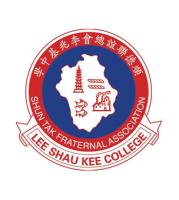| Language Policy |
The School adopts English as the medium of instruction in F.1 - F.3 for all subjects except Chinese Language, Chinese History and Putonghua. To ensure students possess the necessary English standard to study different subjects in English, a summer bridging course is provided to all F.1 students every year. The school also offers remedial English classes to less able students. For nearly 20 years, the school has organized overseas study trips for students to improve their English in a native English-speaking environment and experience foreign cultures. As for Chinese Language, the school promotes extracurricular reading and encourages students to improve their writing skills by taking part in various writing competitions. |
| Learning and Teaching Strategies |
The school aims at enhancing the effectiveness of teaching and learning and helping students to achieve their full potential. The school-based curriculum has been designed to be fun, be practical and most importantly, lay strong foundations for students’ tertiary education in the future. The school also aims to prepare students for public assessments and ensure the effectiveness of teaching by tailoring and adapting the school-based curriculum according to the students’ needs. |
| School-based curriculum |
1. Electives: 3X. Students can choose different elective subjects in Form 4.<br> 2. Curriculum highlights: Multi-intelligence strategies, Cooperative learning, Teaching & Learning in Information Technology to cater for the diverse needs, interests and abilities of learners. |
| Approach to Catering for Learner Diversity |
We offer enhancement and enrichment classes for students with academic needs.<br>With teachers’ instructions and guidance, higher achievers can study one more elective subject in addition to the existing three electives.<br>Students with special needs will be taken care of by teachers, social workers and other classmates.<br> |
| Approach to Integrated Education |
Our school adopts the whole school approach to inclusive education for aligning school policies, culture and practices. Our goals are to develop the potentials and confidence of every student and to give support to students on effective learning and interpersonal skills through personal or focused group counselling. <br> |
| Education Support for Non-Chinese Speaking (NCS) Students |
|
| Home-School Co-operation |
We have close liaison with our parents. Apart from the regular meetings with the Parent-Teacher Association, the school issues regular newsletters to update parents on the school news. Besides, parents are also involved in some of the school administrative process such as the comparison and review of tender. Our school and the PTA also co-organise various functions such as outings and picnics to foster parent-child relationship as well as interest groups and talks for parents. Parents also act as guests to grant scholarship to stellar students at opening ceremonies and enjoy school gatherings at closing ceremonies, on Sports Days, Swimming Gala and at Confucian Dinner. |
| School Ethos |
Our school is committed to creating an environment conducive to harmony, open-mindedness, acceptance and care. Studying in such an atmosphere, students can show their love and care for others. They are self-disciplined, diligent, responsible and innovative. They know how to distinguish rights from wrongs and express themselves well. What’s more, they have insights as well as vision and learn to appreciate.<br><br>We encourage our students to care about our society, particularly the unfortunate, the society and the environment by serving our community. The senior form students act as role models to the junior ones. Through the process, the leadership skills of senior form students are enhanced. |
| School Development Plan |
1. To encourage reflective learning and teaching and to develop our excellence in curriculum, teaching and assessment strategies. <br>a. To promote self-directed learning strategies; <br>b. To enhance students’ language proficiency;<br>c. To enhance the effectiveness of learning, teaching and assessment;<br>d. To cater for learning diversity;<br>e. To increase professional exchange opportunities;<br>f. To promote STEM education / Cross-KLA activities.<br><br>2. To further nurture students’ positive values and attitudes through diverse learning experiences and extracurricular activities.<br>a. To promote Values Education through nurturing in their students the ten priority values and attitudes: "Perseverance", "Respect for Others", "Responsibility", "National Identity", "Commitment", "Integrity", "Care for Others", "Law-abidingness", "Empathy" and "Diligence" ;<br>b. To help students correctly understand Chinese history, appreciate Chinese culture and traditional values, respect the national symbols and signs ; <br>c. To nurture positive values and attitudes through diversified ‘Other learning experiences’. |
| Teacher Professional Training and Development |
To boost our teaching and learning effectiveness on top of strengthening our cooperation with different departments at school, we have organised numerous Staff Development Days to share and exchange our experience with each other and explore new teaching methodologies. We aim at building the school into a learning organisation. Moreover, we support and encourage teachers’ professional development through continuing education, professional exchanges and peer sharing. Teachers actively participate in seminars or further their studies so as to enhance their professionalism. Our experienced teachers are often invited to be the main speakers in various talks about the teaching profession so that our experience of success can be shared with other teachers, educationalists and scholars. |
| Life-wide Learning |
In implementing Other Learning Experiences, our school encourages students to widen their horizons and aims at : <br>1. developing their life-long interests as life-long learners; <br>2. nurturing positive values and attitudes; <br>3. nurturing the five essential Chinese virtues, 'Ethics, Intellect, Physical Development, Social Skills and Aesthetics'; <br>4. becoming active, informed and responsible citizens;<br>5. developing respect for plural values and interests in the arts;<br>6. adopting a healthy lifestyle; and<br>7. enhancing career aspirations and positive work ethics.<br> |
